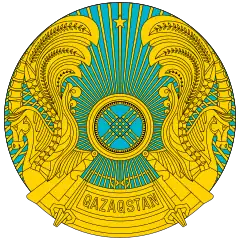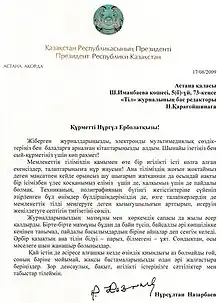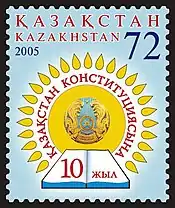President of Kazakhstan
The president of the Republic of Kazakhstan (Kazakh: Qazaqstan Respublikasynyñ Prezidentı; Cyrillic: Қазақстан Республикасының Президенті; Russian: Президент Республики Казахстан, romanized: Prezident Respubliki Kazakhstan) is the head of state of the Republic of Kazakhstan and the commander-in-chief of the Armed Forces of the Republic of Kazakhstan. The president is the holder of the highest office within the Republic of Kazakhstan. The powers of this position are described in a special section of the Constitution of Kazakhstan.
| President of the Republic of Kazakhstan Қазақстан Республикасының Президенті (Kazakh) Президент Республики Казахстан (Russian) | |
|---|---|
 Presidential standard | |
| Style | Mr President (informal) His Excellency (diplomatic) |
| Type | Head of state |
| Residence | Ak Orda Presidential Palace |
| Appointer | Direct popular vote |
| Term length | Seven years, non-renewable |
| Inaugural holder | Nursultan Nazarbayev |
| Formation | 24 April 1990 |
| Salary | ₸7,876,032.18[1][2] |
| Website | (in Kazakh) akorda.kz (in Russian) |
 |
|---|
|
|
|
The position was established on 24 April 1990, a year before the dissolution of the Soviet Union. The current president is Kassym-Jomart Tokayev, who assumed office on 20 March 2019 following the resignation of the first president, Nursultan Nazarbayev.[3] None of the presidential elections held in Kazakhstan have been considered free or fair by Western standards[4] with issues noted including ballot tampering, multiple voting, harassment of opposition candidates and press censorship.
Symbols
The president of Kazakhstan's decorations include a breast mark and a presidential standard.
Presidential standard
The standard of the president of Kazakhstan is similar to the national flag in that it is rectangular in shape with a ratio of 1:2. In the center of the standard is the emblem of Kazakhstan. It is bordered on three sides with golden fringe.[5][6]
.svg.png.webp)
The current presidential standard has been in service as recently as 2012. The former standard, which was used from 1995–2012, was a light blue rectangle there with a golden circle in which the figure of the young Kazakh leader Sakas riding a snow leopard.
Altyn Qyran Order
The Order of the Golden Eagle (Kazakh: Алтын Қыран ордені or Altyn Qyran Order) is the highest civilian award that can be awarded by the president of Kazakhstan. Its purpose is to recognize outstanding service to the country by Kazakh and foreign citizens. As head of state, the president is de facto Commander special class of the Order of Altyn Kyran.[7][8]
President in the Constitution
Item 5 of Article 42 of the Constitution determines that no one can be elected president more than two terms in a row, but it also states that "The present restriction shall not extend on the First President of the Republic of Kazakhstan." [9]
Article 46 says that the president's "honor and dignity shall be inviolable" and that his expenses shall be paid by the state. Item 4 of the article outlines the special status and authority of the first president, and refers to a special constitutional act for definitions.[9] According to this act, the first president possesses total, absolute and termless immunity for all actions he performs while in office, and that he remains a government official until his death. He also retains the ability to speak to the people of Kazakhstan, keeps guards, communication, transport, and state support of his activity, and that his official apartment and summer residence became his property with official maintenance. He is also provided with medical care, sanatorium, pensions and insurance.
On April 26, 2015, Nursultan Nazarbayev was re-elected for his 5th presidential term.[10] The official ceremony of the inauguration took place at the Palace of Independence in Nur-Sultan on April 29.[10] At the inauguration ceremony the re-elected president assured the nation that he would continue the 5 institutional reforms that he had offered earlier, which would contribute to the consistent growth and development of the country.[10]
On January 25, 2017, President Nursultan Nazarbayev laid the groundwork for reforms to the constitution that would redistribute executive powers to the parliament and ministries for the purpose of more open and efficient governance.[11]
Presidential Administration

The Presidential Administration of the Republic of Kazakhstan (Kazakh: Қазақстан Республикасы Президентінің Әкімшілігі/Russian: Администрация Президента Республики Казахстан) reports directly to the president and aids him/her in their everyday dates. It was established in accordance of Presidential Decree No. 2565 on October 20, 1995. It is currently based at the Ak Orda Presidential Palace in the capital city of Nur-Sultan. Prior to that, it was based in Almaty.[12]
The Organization for Security and Co-operation in Europe (OSCE) and other international monitors criticised the election as unfair, with issues noted including the closure of media outlets critical of the government and the jailing of opposition activists.[13] OSCE spokesperson Cornelia Jonker criticised the lack of a "genuine choice" for voters and also argued that there were "significant restrictions to the freedom of expression."[14]
The date of Kazakhstan's fifth presidential election is June 9, 2019. It is the first election since the resignation of the first president of Kazakhstan, Nursultan Nazarbayev.[15]
Constitution
The Constitution of the Republic of Kazakhstan (Kazakh: Қазақстан Республикасының Конституциясы, romanized: Qazaqstan Respublikasynyñ Konstitutsiasy, Russian: Конституция Казахстана) is the highest law of Kazakhstan, as stated in Article 4. The Constitution was approved by referendum on 30 August 1995.[16] This date has since been adopted as the "Constitution Day of the Republic of Kazakhstan".[16]
Kazakh language is the official language of the state, while Article 7, section 2 states that the "Russian language shall be officially used on equal grounds".[17]
Preamble
The preamble of the constitution emphasizes the importance of "freedom, equality and concord" and Kazakhstan's role in the international community.[16]
"We, the people of Kazakhstan, united by a common historic fate, creating a state on the indigenous Kazakh land, considering ourselves a peace-loving and civil society, dedicated to the ideals of freedom, equality and concord, wishing to take a worthy place in the world community, realizing our high responsibility before the present and future generations, proceeding from our sovereign right, accept this Constitution."
Section 1, General Provisions
Article 1
Article 1 establishes the state as a secular democracy that values individual "life, rights and freedoms." It outlines social and "political stability, economic development," patriotism, and democracy as the principles upon which the Government serves. This is the first article in which the Parliament is mentioned.[16]
Article 2
Article 2 states that Kazakhstan is a unitary state and the government is presidential. The government has jurisdiction over, and is responsible for, all territory in Kazakhstan. Regional, political divisions, including location of the capital, are left open to lower-level legislation. "Republic of Kazakhstan" and "Kazakhstan" are considered one and the same.[16] The Republic of Kazakhstan shall build its relations with all countries on the principles of international law.
Article 3
The government's power is derived from the people and citizens have the right to vote in referendums and free elections. Article 3 establishes provincial government. Representation of the people is a right reserved to the executive and legislative branches. The government is divided between the executive, legislative, and judicial branches. Each branch is prevented from abusing its power by a system of checks and balances. This is the first article to mention constitutional limits on the executive branch.[16]

Article 4
Laws that are in effect include "provisions of the Constitution, the laws corresponding to it, other regulatory legal acts, international treaty and other commitments of the Republic as well as regulatory resolutions of Constitutional Council and the Supreme Court of the Republic." The Constitution is made the highest law. Ratified international treaties supersede national laws and are enforced, except in cases when upon ratification the Parliament recognizes contradictions between treaties and already enacted laws, in which case the treaty will not go into effect until the contradiction has been dealt with through legislation. The government shall publish all laws.[16]
Presidents of Kazakhstan (1990–present)
Notes
References
- "Зарплаты президентов – Новости Таджикистана ASIA-Plus". news.tj. Archived from the original on 2019-06-03.
- "Сколько зарабатывает Путин и президенты других стран / FinHow.ru". finhow.ru.
- Kazakhstan President Embassy of Kazakhstan
- Kazakhstan's long term president to run in snap election – again, The Guardian, 11 March 2015
- "Официальный сайт Президента РК :: КАЗАХСТАН". 5 October 2008. Archived from the original on 5 October 2008.
- "Персональная страница". personal.akorda.kz. Archived from the original on 2019-06-01. Retrieved 2019-03-25.
- "Symbols of power". Akorda. Archived from the original on 9 July 2015. Retrieved 25 March 2019.
- "Awards and orders of the Republic of Kazakhstan". Government of Kazakhstan. Retrieved 25 March 2019.
- Constitution of the Republic of Kazakhstan Archived 2007-10-20 at the Wayback Machine Constitutional Council of the Republic of Kazakhstan
- "Re-elected President Inaugurated, Announces Five Reform Efforts". astanatimes.com.
- "Kazakh President Unveils Plans of Constitutional Reforms". The Astana Times.
- "Электронное правительство Республики Казахстан -". egov.kz.
- "Kazakh strongman says sorry for landslide election victory". telegraph.co.uk. 27 April 2015.
- Kazakhstan president Nursultan Nazarbayev wins re-election with 97.7 per cent of vote, ABC Australia, 28 April 2015
- "Early presidential election in Kazakhstan set for June 9; President Tokayev pledges fair and transparent vote". The Astana Times.
- Constitution of Kazakhstan Archived 2007-02-18 at the Wayback Machine City Montessori School Lucknow, India
- Aksholakova, Assem; Ismailova, Nurgul (21 October 2013). "The Language Policy of Kazakhstan and the State Language in Government Service". Procedia - Social and Behavioral Sciences. 93: 1580–1586. doi:10.1016/j.sbspro.2013.10.085.
_(cropped).jpg.webp)